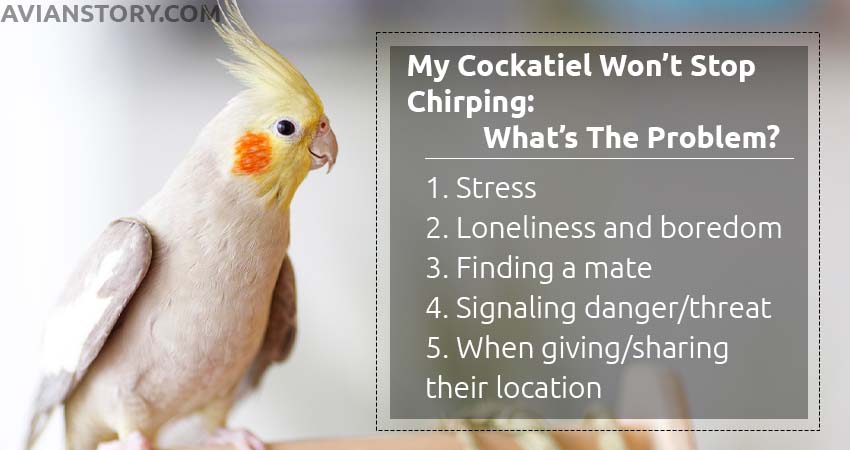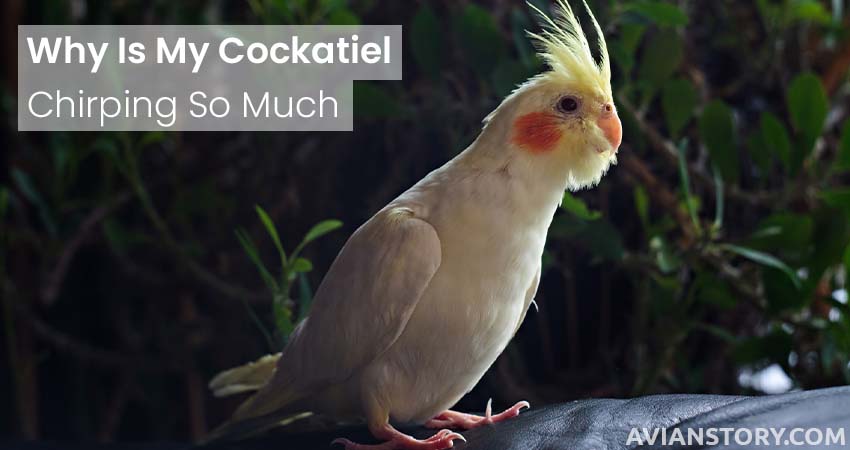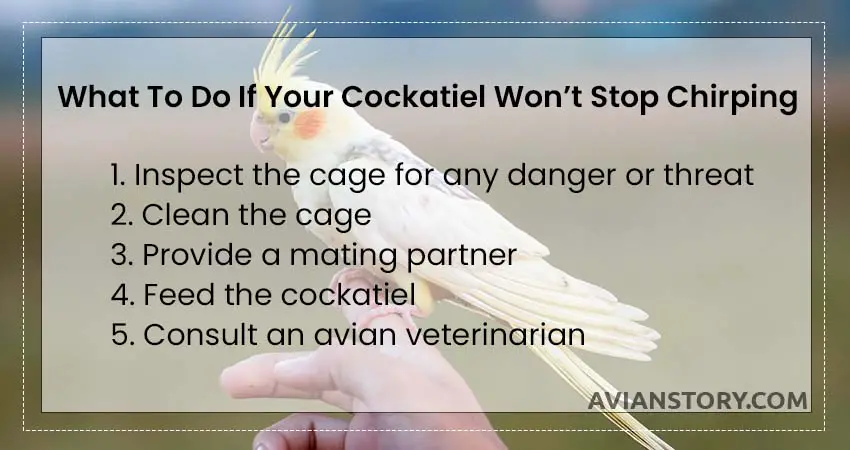Why my Cockatiel Won’t Stop Chirping [Explained!]
Cockatiels’ chirping behavior is normal and natural. They use the chirping sound to relay messages in the wild environment. However, while in the cages, your cockatiel may chirp non-stop.
So you might ask, why your cockatiel won’t stop chirping? That is because they might be excited or extremely happy. At times, cockatiels might chirp non-stop to communicate if they are lonely, hungry, stressed or trying to look for a mate. Some will chirp when bored and try to share their location.
In this article, we shall discuss why your cockatiel won’t stop chirping and how to stop them from becoming too noisy. Also, we shall explain the meaning of various cockatiel chirping sounds.
Why My Cockatiel Won’t Stop Chirping: What’s The Problem?

Chirping is a natural sound that cockatiels make to communicate certain messages. Their chirping has different intonations and durations meant to relay different messages.
However, you might notice that your cockatiel chirps non-stop on some occasions. It is not their norm to chirp for long; most owners tend to worry whether there is anything wrong with their pets.
In the natural habitat’s context, cockatiels make different sounds, such as screaming, piercing squawks, whistling and cheeping while sleeping. If these sounds are made persistent, the cockatiel is trying to communicate something without success.
Likewise, when your cockatiel doesn’t stop chirping, it doesn’t only mean there is a problem; cockatiels can chirp continuously if they are happy, in a good mood and enjoying the weather. However, when distressed or lonely, they won’t stop chirping.
Let’s look at the reasons why your cockatiel won’t stop chirping.
1. Stress
When cockatiels are stressed, they chirp non-stop till help comes their way. Being a sensitive bird, small amounts of stress cause it to react immensely. To identify a stressed cockatiel, look for signs of restlessness and not feeding.
On approach, the bird chirps even sharper and with aggression. So be quick to identify what is causing the bird to chirp non-stop. Ensure the cage and bedding are dry and clean. Check for any threats around and within the cage.
2. Loneliness and boredom
A lonely cockatiel won’t stop chirping until they get a companion. For companionship, cockatiels may feel okay with the owner’s company in the compound. It may also be craving for a cockatiel partner.
Therefore, it would be best if you observed its behavior when near you. If okay with your company, there is no need to bring in another bird. However, if your cockatiel still chirps non-stop with your presence, seek to get it a partner. But carefully select a mating partner compatible with your cockatiel.
3. Finding a mate
Cockatiels are very sensitive pets when it comes to mating. The male makes unique sounds, chirping and hopping around the cage. All these are intended to lure the female partner.
Provide a mating partner of their choice by exposing your cockatiel to other cockatiels. If you fail to provide a mating partner, your cockatiel won’t stop chirping until it gets off-heat.
4. Signaling danger/threat
When in danger or under threat, cockatiels will chirp non-stop to seek help. That time the chirping sound is aggressive and directed toward danger.
As the danger nears the cage, cockatiels become more aggressive and the chirping increases. Run to its rescue and ensure its safety at all times. Ensure the cage is safe from intruders.
5. When giving/sharing their location
Cockatiels will share their location for various reasons when looking for a mating partner, seeking help or bored and needing company from other birds.
The chirping is always loud enough with a high pitch to communicate for far distances.
Why Is My Cockatiel Chirping So Much

Cockatiels will normally chirp for a few minutes and then stop. The average chirps occur twice or three times a day. However, you may notice your cockatiel chirping so much.
Once the chirping gets off the normal routine or becomes more frequent, you need to observe what they are trying to communicate. Below are some of the reasons why your cockatiel is chirping so much.
- If your cockatiel is too happy or excited. The chirping increases, and you will notice a happy mood.
- When cockatiels are lonely or bored. This happens especially when alone in the cage. The chirping is accompanied by restless moves and attempts to fly.
- When fed their favorite meal. Cockatiels will chirp so much after being served a favorite meal. Once you stop serving the meal, they will now chirp aggressively for the meal once more.
- Cockatiels will chirp so much if the cage is left dirty for a long. You will notice the birds chirping while perching. Thus, they tend to avoid dirty floors.
What To Do If Your Cockatiel Won’t Stop Chirping

The chirping sound is not that appealing, especially when made non-stop. It’s every pet owner’s dream to have a less noisy and calm pet. So, what can you do if your cockatiel won’t stop chirping?
1. Inspect the cage for any danger or threat
Inspect the cage and the surrounding for possible threats. Ensure no hawks are hovering around the cage. Inside the cage, check for ants’ attack as well.
Besides, you can relocate the cage if there is too much lighting, especially at night. During the day, you can cover the cage with a light blanket to block the sun’s rays.
2. Clean the cage
Some cockatiels are sensitive to dirt and any bad smell. Keep the cage tidy and free from bad odor. Try cleaning the cage daily for housing more than two cockatiels.
Changing the bedding once they get wet and dumpy would be best as well. Use wood shavings for better urine and water absorption.
3. Provide a mating partner
Observe the behavior of your cockatiel; if you see signs of mating, provide a mating partner. In selecting a mating partner, ensure they are compatible.
An aggressive partner will cause chaos in the cage and increase the chirpings. In that case, you can consult an avian specialist when selecting a cockatiel mating partner.
4. Feed the cockatiel
Your cockatiel might be starving. Prepare its favorite meal and serve and then observe the behavior. If your cockatiel doesn’t eat, you may require to consult an avian veterinarian.
5. Consult an avian veterinarian
When you try all other possible attempts but your cockatiel won’t stop chirping, be quick to seek medical assistance.
The avian veterinarian will examine it for possible illness. Ensure you follow the doctors’ prescriptions for better results.
FAQs
Here are the frequently asked questions by cockatiel owners experiencing similar problems of non-stop chirping.
What does a softly chirping cockatiel mean?
Softly chirping cockatiel means that your pet is happy and satisfied. The chirping happens with the cockatiel resting, indicating it is okay.
How do you interpret cockatiels’ chirping sounds?
Cockatiels make different chirping sounds to communicate different messages. A soft and calm chirp indicates a happy mood. If the chirp is so loud, restless and won’t stop, it might signal something is wrong.
Conclusion
Chirping in cockatiels is a normal and natural characteristic. It adapts the bird to communicate with the owner and other cockatiels. However, when cockatiels chirp non-stop, it signals a problem that should be addressed.
Inspect the bird and its behavior to find out why your cockatiel is chirping so much without stopping. Ensure your cockatiel is always comfortable, and chirping will be normal.
